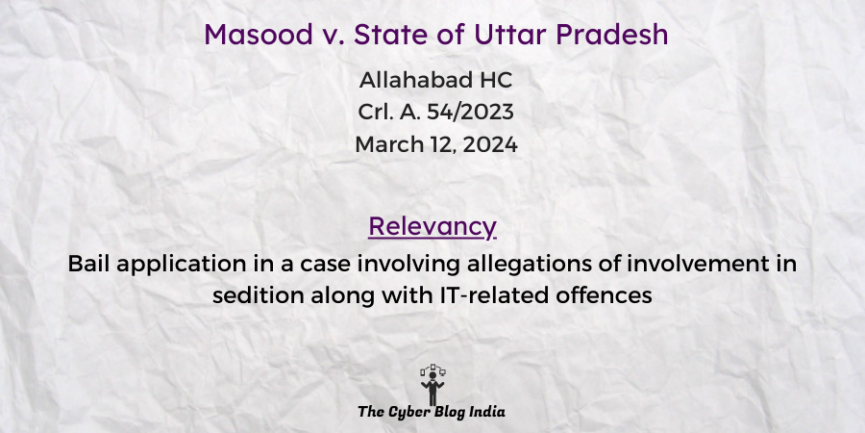Masood v. State of Uttar Pradesh

Masood v. State of Uttar Pradesh
In the High Court of Allahabad
Crl. A. 54/2023
Before Justice AR Masoodi and Justice AK Srivastava-I
Decided on March 12, 2024
Relevancy of the case: Bail application in a case involving allegations of involvement in sedition along with IT-related offences
Statutes and Provisions Involved
- The Information Technology Act, 2000 (Section 65, 72)
- The National Investigation Agency Act, 2008 (Section 21(4))
- The Indian Penal Code, 1860 (Section 120B, 124A, 153A, 295A)
- The Unlawful Activities (Prevention) Act, 1967 (Section 17, 18, 43D (5))
Relevant Facts of the Case
- Masood, along with three others, faced charges of sedition, conspiracy, and IT-related offences.
- The allegations outlined his involvement with terrorist organisations such as PFI and CFI.
- Despite no incriminating evidence found, Masood remained in custody since October 5, 2020.
- The court granted bail to the co-accused, including those with similar roles.
- The court rejected Masood’s bail plea, citing sufficient evidence and alleged PFI association.
Prominent Arguments by the Advocates
- The appellant’s counsel argued that there was a lack of prima facie evidence linking Masood to terrorist activities or unlawful associations. The prosecution wrongly applied the UAPA provisions. Moreover, the court did not consider the lengthy custody duration, while the higher court has already granted bail to the co-accused.
- The state’s counsel submitted that there was substantial evidence against Masood, including alleged association with PFI. The Special Court rejected his bail on valid grounds. While the counsel acknowledged the bail granted to the co-accused, he maintained Masood’s involvement in the conspiracy.
Opinion of the Bench
- There is a lack of substantial evidence linking him to the alleged terrorist activities.
- The Special Court failed to assess the available evidence and circumstances adequately.
Final Decision
- The court set aside the lower court’s order and granted bail to the appellant, with conditions.
